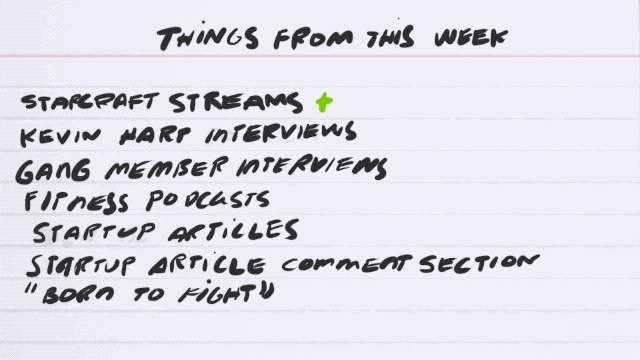In this episode of The College Info Geek Podcast (“Hyperfocus”), Thomas and Martin talk about Hyperfocus by Chris Bailey.
A few notes.
- People are super super distracted (distracted every 40 seconds, probably by email) — People find a hard time getting any work done during the majority of time working. They mention the stat that work email is opened, on average, within 6 seconds of receipt.
- Scatterfocus (hard to connect the dots if you don’t have dots to start with) — Here’s how it’s described in Hyperfocus, by Chris Bailey
”Just as hyperfocus is your brain’s most productive mode, scatterfocus is its most creative. Entering scatterfocus mode is easy: you simply let your mind be. Just as you hyperfocus by intentionally directing your attention toward one thing, you scatterfocus by deliberately letting your mind wander. You enter this mode whenever you leave attentional space free around what you’re doing in the moment—whether going for a run, biking, or investing time in anything that doesn’t consume your full attentional space.”
- Connection: Range by David Epstein — Thomas mentions this book and says he’s halfway through it but he completely recommends it. It’s about top performers in fields getting there by integrating experience from many disciplines. There’s a sampling period before specializing.
- Something Epstein mentions is that one of the working titles was Woods vs. Federer. Tiger Woods being a poster child for starting to specialize when you’re still in a crib and Federer is an example of someone who tried a bunch of different sports before becoming the greatest tennis player of all time.
- And I’m going to continue my recent run of Starcraft mentions in blog posts by dropping an excerpt here from Range:
In 2019, in a limited version of StarCraft, AI beat a pro for the first time. (The pro adapted and earned a win after a string of losses.) But the game’s strategic complexity provides a lesson: the bigger the picture, the more unique the potential human contribution. Our greatest strength is the exact opposite of narrow specialization. It is the ability to integrate broadly. According to Gary Marcus, a psychology and neural science professor who sold his machine learning company to Uber, “In narrow enough worlds, humans may not have much to contribute much longer. In more open-ended games, I think they certainly will. Not just games, in open ended real-world problems we’re still crushing the machines.”
This also relates to the notes I wrote yesterday about a Quentin Tarantino interview. They talk about the importance of enjoying things from different genres and different mediums. You’ll be able to pull from all those different things you’re taking in and use them in your own work. Thomas Frank mentioned how the main character in Avatar learns new skills from different regions. I’m currently reading Born to Fight, and recently read a part where Mark Hunt (MMA fighter) describes switching from K1 (kickboxing) to Pride (MMA) early in his career. Everyone in Pride knew the importance of the ground game. He had no experience with the ground game.
From Born to Fight:
A few months later I returned for my first Pride fight, which was to be part of an event called Critical Countdown at the 50,000-seat Saitama Super Arena. I would end up fighting more than half of my MMA fights at this arena.
In the press conference preceding the fight I was asked how much time I’d had fighting on the ground, and I replied honestly.
‘About eight hours.’
There was a ripple of laughter through the crowd, and also from my fellow fighters up on stage. The one who was really giving out a good old belly laugh was Fedor.
‘It was a good eight hours though,’ I said. That was the moment I realised eight hours probably wasn’t enough.
- Reading, audiobooks — He mentioned that if there’s a book that he’s taking notes on he’s not going to listen to it as an audiobook. Except for a current experiment wehre he’s currently listening to Hit Makers and will read the book after listening to it to see how that goes.
- My own experience has been that if I listen to a book first and try reading it afterward, I just have no motivation to read it. But if I read the book first and then listen to it, it helps reinforce things a lot and is just a better way to review a book.
- Be intentional by picking fewer things to do today — It’s really important to set a deliberate intention for every working session. I’ve found the pomodoro technique can be useful for this. I also find that I never stick to doing the pomodoro technique for too long.
- Create a distraction-free ritual — Set up a sequence of steps to get into a focus mode. Those things that distract you probably aren’t complete surprises. You can plan for those things. If most of your distractions come through your phone, then you can set things up so that you don’t have access to your phone for some period of time that you want to focus.
- Summary of Thomas‘s focus ritual:
- Blocking sites (with Freedom)
- Setting a timer (with Be Focused)
- Letting people know he’s going into a focus period and asks to not be interrupted











